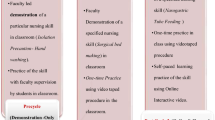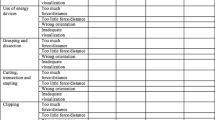Summary
By paying attention to the power of the medium and the method of feedback, videotaping programs can be a remarkably successful teaching and research tool. Learners can view their performance, review feedback on their own behavior, knowledge, and displayed attitudes, and develop plans to change behavior that can be followed up on subsequent tapings. In addition, trainees can share important experiences with each other and valued teachers.
Interviewing skills can be documented and preserved, creating a video library that allows trainees to actually visualize improvements in their own performances over time. An archive of many such performances allows trainees, faculty, and researchers alike comparative access to the complex challenges of the medical interview.
Similar content being viewed by others
References
Stoeckle JD, Billings JA. A history of history-taking: the medical interview. J Gen Intern Med. 1987;2:119–27.
Inui TS, Carter WB. Problems and prospects for health services research on provider-patient communication. Med Care. 1985;23:521–38.
Beckman HB, Frankel RM. The effect of physician behavior on the collection of data. Ann Intern Med. 1984;101:692–6.
Beckman HB, Markakis KM, Suchman AL, Frankel RM. The doctor-patient relationship and malpractice: lessons from patient depositions. Arch Intern Med. 1994;154:1365–70.
Kaplan SH, Greenfield S, Ware JE Jr. Assessing the effects of physician-patient interactions on the outcomes of chronic disease. Med Care. 1989;27(suppl 3):S110-S127.
Beckman HB, Frankel R, Kihm J, Kulesza G, Geheb M. Measurement and improvement of humanistic skills in first-year trainees. J Gen Intern Med. 1990;5:42–5.
Novack DH, Volk G, Drossman DA, Lipkin M Jr. Medical interviewing and interpersonal skills teaching in US medical schools. JAMA. 1993;269:2101–4.
Maguire GP, Rutter DR. HIstory-taking for medical students. I—difficiencies in performance. Lancet. 1976;ii:556–58.
Scheidt PC, Lazoritz S, Ebbeling WL, Figelman AR, Moessner HF, Singer JE. Evaluation of a system providing feedback to students on videotaped patient encounters. J Med Educ. 1986;61:585–90.
Maguire GP, Fairbair S, Fletcher C. I. Benefits of feedback training in interviewing as students persist. Br Med J. 1986;292:1573–8.
Schoonover SC, Basuk EL, Smith R, Gaskill D. The use of videotape programs to teach interpersonal skills. J Med Educ. 1983;58:804–10.
Stoeckle JD, Lazare A, Weingarten C, McGuire MT. Learning medicine by videotape recordings. J Med Educ. 1971;46:518–24.
Simek-Downing L, Guirk M. Videotape analysis of medical students’ interviewing skills. Fam Med. 1985;17:57–60.
Branch WT. Teaching models in an ambulatory training program. J Gen Intern Med. 1990;5:515–26.
Premi J. An assessment of 15 years’ experience in using videotape review in a family practice residency. Acad Med. 1991;66:56–7.
Frankel RM, Beckman HB. Impact: an interaction-based method for preserving and analyzing clinical transactions. In: Pettingrew I. (ed). Straight Talk. Louisville, KY: Humana Inc., 1982.
DiMatteo MR, Taranta A, Friedman HS, Prince IM. Predicting patient satisfaction from physicians nonverbal communication skills. Med Care. 1980;20:376–87.
Carter WB, Inui TS, Kukull WA, Haigh VH. Outcome-based doctor-patient interaction analysis: II. Identifying effective provider and patient behavior. Med Care. 1982;20:550–66.
Lipkin M, Quill TE, Napodano RJ. The medical interview: a core curriculum for residencies in internal medicine. Ann Intern Med. 1984;100:277–84.
Frankel RM, Beckman HB. The accuracy of the medical history. In: Lipkin M, Putnam S, Lazare A (eds). The Medical Encounter. New York: Springer-Verlag, 1994.
Frankel RM. Unpublished work, 1986.
Skeff KM, Campbell M, Statos G, Jones HW, Cooke M. Assessment by attending physicians of a seminar method to improve clinical teaching. J Med Educ. 1984;59:944–50.
Cassie JM, Collines GF, Daggett CJ. The use of videotapes to improve clinical teaching. J Med Educ. 1977;52:353–4.
Kalet A, Earp JA, Kowlawitz V. How well do faculty evaluate the interviewing skills of medical students. J Gen Intern Med. 1992;7:449–505.
Maguire GP, Clarke D, Jolley B. An experimental comparison of three courses in history-taking skills for medical students. Med Educ. 1977;11:175–82.
Wasserman RC, Inui TS. Systematic analysis of clinician-patient interactions: a critique of recent approaches with suggestions for future research. Med Care. 1983;21:279–93.
Noel GL, Herbers JE Jr, Caplan MP, Cooper GS, Pangaro LN, Harvey J. How well do internal medicine faculty members evaluate the clinical skills of residents? Ann Intern Med. 1992;117:757–65.
Nathan RG, Hohmann LK, Nusbaum HJ. Initial evaluation of a hidden agenda method of teaching the intern. Fam Med. 1991;23:285–8.
Author information
Authors and Affiliations
Additional information
Supported in part by a grant from Bureau of Health Professions, HRSA, USPHS (PE15262).
Rights and permissions
About this article
Cite this article
Beckman, H.B., Frankel, R.M. The use of videotape in internal medicine training. J Gen Intern Med 9, 517–521 (1994). https://doi.org/10.1007/BF02599224
Issue Date:
DOI: https://doi.org/10.1007/BF02599224




